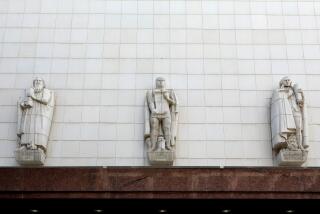Retirement Announced by County’s Senior Jurist : Courts: Lawrence Storch says he will step down from the Superior bench when judgeship expires in January, ending a 19-year judicial career.
Superior Court Judge Lawrence Storch, Ventura County’s senior jurist and the target last year of a prosecution campaign to remove him from criminal cases, announced his retirement Wednesday, saying he will step down from the bench when his judgeship expires in January.
The 61-year-old Storch--who has gained a reputation over the years as knowledgeable, even-handed and sometimes more lenient than prosecutors would like--is ending his 19-year judicial career to pursue private interests.
For the record:
12:00 a.m. Oct. 13, 1995 For the Record
Los Angeles Times Friday October 13, 1995 Ventura County Edition Metro Part B Page 8 Zones Desk 1 inches; 25 words Type of Material: Correction
Wrong information--An article Oct. 5 incorrectly reported the retirement date for Ventura County Superior Court Judge Lawrence Storch. His judgeship expires in January, 1997.
“He had been warning us for some time he was not going to seek reelection,” said Sheila Gonzalez, executive officer of Ventura County’s Superior and Municipal courts.
“He just felt it was time to move on and open up new horizons,” Gonzalez said. “We are going to miss him around here.”
Storch, who would not comment on his retirement, was selected by county judges in 1973 to be a Superior Court commissioner and was appointed to the Superior Court by Gov. Jerry Brown in 1977.
He has been involved in a number of high-profile cases, including a 1989 landmark ruling that DNA “fingerprinting” evidence was admissible in court. He was named 1994 Superior Court Judge of the Year, the third time he had received that honor.
Last year, Dist. Atty. Michael D. Bradbury set out to ban Storch from hearing new felony cases, a move that reduced the jurist’s criminal caseload to the point he transferred to hearing civil cases.
Bradbury never publicly announced a reason for the move against Storch, but the action was taken shortly after the judge reduced a jury’s first-degree murder conviction to second-degree murder.
The ban also revived an old dispute.
Storch is a longtime critic of Bradbury’s policy against plea-bargaining, saying it bogs down the courts with unnecessary trials. Bradbury has described Storch as a whiny judge “who would be very happy if all of his cases went away through plea-bargaining.”
In a 1991 profile of Storch, Bradbury described him as “a fairly lenient sentencer, which on occasion has resulted in additional victimizations.” He cited two cases in which Storch facilitated the release of defendants who promptly committed more crimes.
Bradbury was unavailable Wednesday for comment. But Chief Assistant Dist. Atty. Kevin McGee said the move against Storch stemmed from professional differences between prosecutors and the judge.
“It was mostly a situation where we felt we did what we had to do to protect our clients’ interest and I’m sure if you talk to Judge Storch he will say he did what he had to do,” McGee said. “We have had our differences in the past but we basically wish him well in this decision.”
Those who know Storch said they believe his decision not to seek a fourth judicial term is unrelated to the district attorney’s actions.
“I’m 100% certain that the D.A.’s actions had nothing to do with his decision not to seek reelection,” said Judge Charles W. Campbell Jr., presiding judge of the Superior Court. “All that did was make his last year or so in criminal less pleasant.”
Campbell joined others in saying Storch will be missed when he leaves in January.
“He’s a tremendous judge and has been a good leader on the court for many, many years,” he said. “He is absolutely fair and he really epitomizes what you would hope to get in a judge.”
More to Read
Sign up for Essential California
The most important California stories and recommendations in your inbox every morning.
You may occasionally receive promotional content from the Los Angeles Times.










